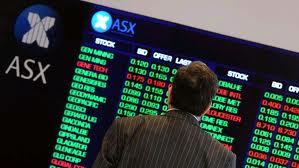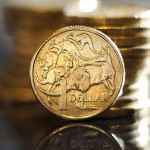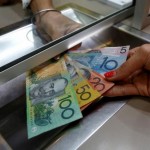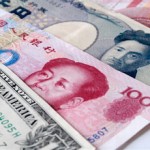Aussie Near 4-Year Low as Lowe Says It May Weaken; Won Advances

Australia’s dollar traded 0.3 percent from a four-year low after central bank Deputy Governor Philip Lowe said yesterday the currency will probably depreciate in line with commodity export prices.
The yen was near the weakest level in seven years against the U.S. dollar as Bank of Japan board member Sayuri Shirai said she supported the central bank’s additional monetary stimulus last month. The greenback was little changed against most of its major peers before a report economists said will show orders for durable goods slid for a third month. The South Korean won rose for a third day.
“Weaker commodity prices and the possibility that the interest-rate differential could narrow between the U.S. and Australia, with the Fed looking to raise interest rates next year, have been pointing to a weaker Australian dollar for some time,” said Janu Chan, a Sydney-based economist at St. George Bank Ltd. who attended the Australian Business Economists’ annual dinner yesterday where Lowe spoke.
Australia’s dollar traded at 85.41 U.S. cents as of 2:46 p.m. in Tokyo from 85.30 yesterday, when it touched 85.14, the least since July 2010.
The yen gained 0.1 percent to 117.81 per dollar, after touching 118.98 on Nov. 20, the weakest since August 2007. The euro was little changed at $1.2471. The single currency bought 146.92 yen from 147.17.
Lowe Speech
Reserve Bank of Australia Governor Glenn Stevens warned last week there was a “pretty material risk” that the nation’s currency will go lower. Iron ore fell below $70 yesterday for the first time in five years as rising low-cost supplies from the world’s top miners deepen a global glut. Iron ore is Australia’s largest export.
“If the exchange rate is to play its important stabilizing role, it needs to go down when the terms of trade and investment are declining,” Lowe said in his speech. “We have seen some adjustment, but if our assessment of the fundamentals is correct we would expect to see more in time.”
There are more downside than upside risks for Japan’s economy, BOJ board member Shirai said in Hiroshima today. At the policy meeting on Oct. 31, officials unexpectedly voted to expand monetary stimulus.
Investor positions predicting declines in the yen “seem particularly small” as the addition of short bets after the BOJ’s surprise easing was followed by profit-taking, Citigroup Inc. strategists Steven Englander and Pierre-Alexandre Noual wrote in a client note. Investors are “far from fully loaded” on positions betting on weakness in the yen and euro, they wrote. A short position is a bet an asset will fall.
Yen Move
“Few investors have caught the euro and yen moves with both hands, although many have a toe or two dipped in the water,” according to the note.
The yen dropped 7 percent in the past month, the worst performer among 10 developed-market currencies tracked by Bloomberg Correlation-Weighted Indexes. The Aussie fell 1 percent, while the dollar, the biggest gainer, strengthened 2.3 percent. The euro added 0.5 percent over the period.
“The U.S. dollar’s moved already a long way,” St. George Bank’s Chan said. “Maybe a lot of that good news from the U.S. economy has already been built in.”
Traders see a 56 percent chance that the Fed will raise its benchmark target rate by October, according to data compiled by Bloomberg based on federal funds futures.
Orders for durable goods in the U.S. dropped 0.6 percent in October after falling 1.1 percent the previous month, according to the median estimate of economists surveyed by Bloomberg News.
The won appreciated 0.2 percent to 1,107.15 per dollar after gaining 0.4 percent during the previous two days.
Source: Bloomberg – Aussie Near 4-Year Low as Lowe Says It May Weaken; Won Advances





























